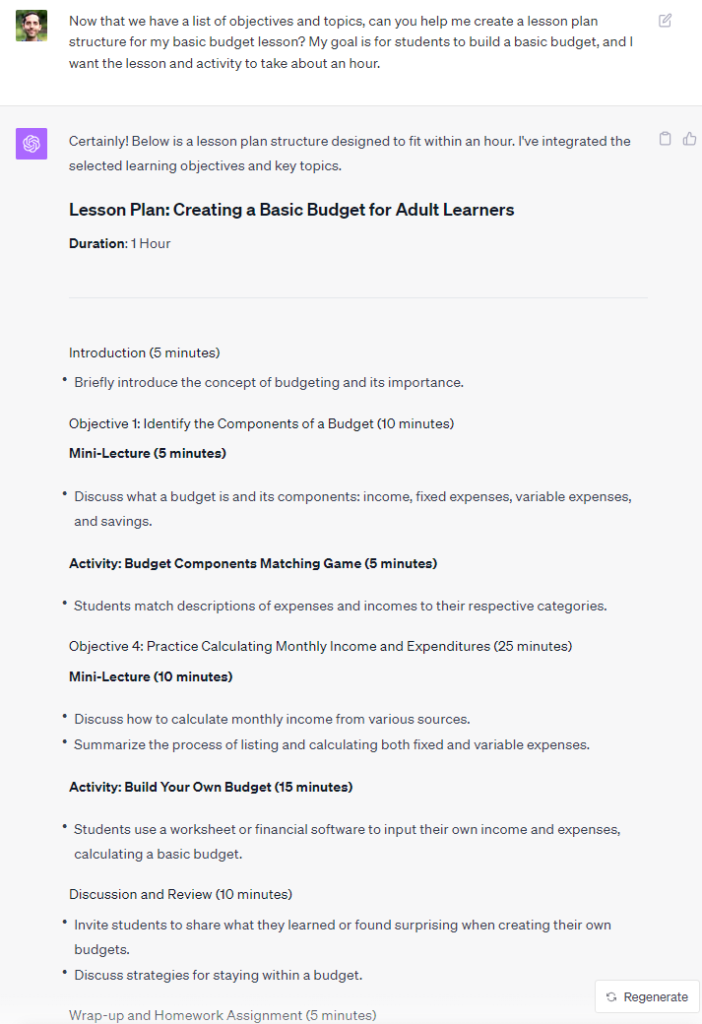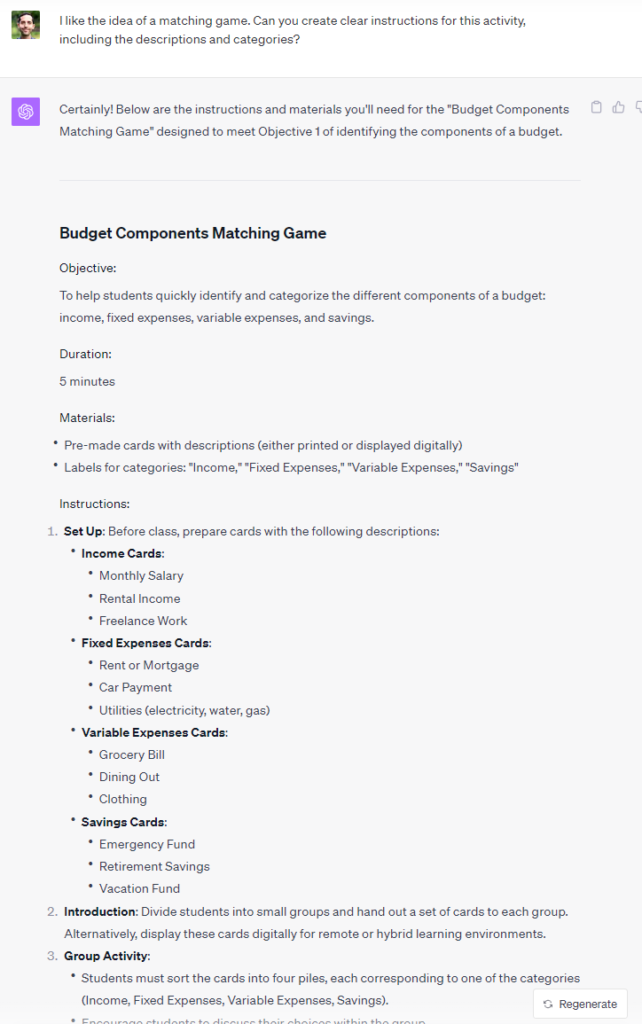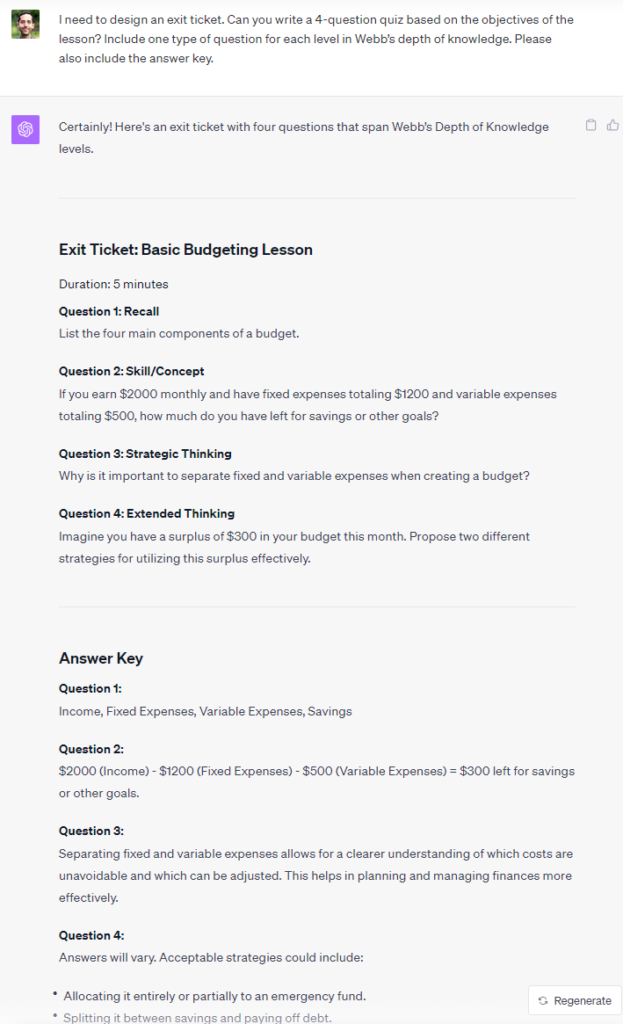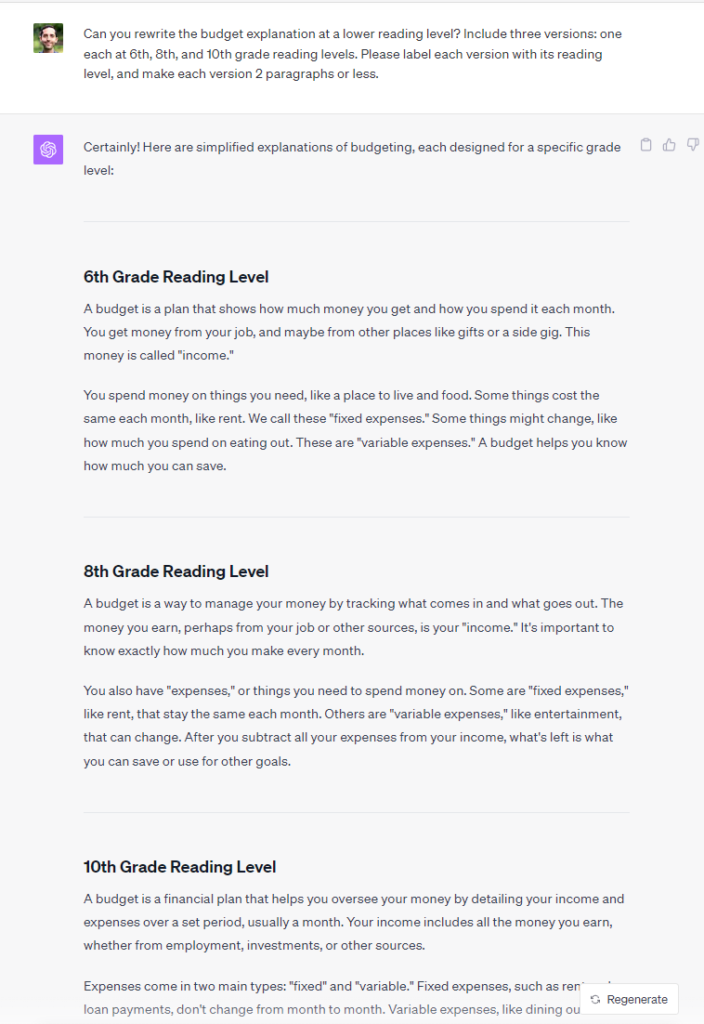By Ryan Stivers and Joey Lehrman
Lesson planning can be a complicated process, especially for adult educators that are tasked with meeting diverse needs while also creating interesting activities that can support engagement and retention. And, since many adult educators wear several hats, there’s seldom enough time in the day to develop relevant and interesting learning experiences for students.
Fortunately, the advent of artificial intelligence tools like ChatGPT can provide meaningful support for busy educators. In this blog post, we’ll provide a step-by-step guide for how to use ChatGPT to create an effective lesson plan and design activities tailored for adult learners.
⭐ Pro tip: Remember that ChatGPT works best when prompts build upon each other. This means you can ask follow-up questions or add more details in the same conversation thread, helping the AI to provide more specific answers and responses to your prompts. So in the example below, each of these prompts would take place in the same thread, building on the previous responses and overall conversation.
Step 1: Define Your Learning Objectives
Using the Understanding by Design (UBD) framework, effective lesson plans typically start with clearly defined goals or learning objectives. This step ensures that the lesson plan is aligned with desired student outcomes.
To showcase the full lesson plan development, this blog will explore the process for building a lesson plan on financial literacy and budgeting.
Sample Prompt
“Can you help me define clear learning objectives for a lesson on [your topic]? I want my adult learners to be able to [specific outcome].”
Or:
“Can you help me define clear learning objectives for a lesson on financial literacy? I want my adult learners to be able to create a basic budget.“

Step 2: Brainstorm Content and Topics
Based on the brainstorming with ChatGPT, consider which objectives best fit with the goals and intent of the lesson. With those in mind, ChatGPT can now help to brainstorm content and topics for the lesson.
Sample Prompt
“Great, let’s go with the learning objective [ xxxxx ]. Based on this objective, can you provide me with key topics to include in the lesson plan?”

Step 3: Develop a Lesson Structure
Now it’s time to create the structure of the lesson. Ask ChatGPT for guidance on how to organize the lesson plan effectively.
Sample Prompt“Now that we have a list of objectives and topics, can you help me create a lesson plan structure for my basic budget lesson? My goal is for students to build a basic budget, and I want the lesson and activity to take about an hour.”

Step 4: Create Engaging Activities
Designing engaging activities is a crucial part of any lesson plan. ChatGPT can assist in generating activity ideas that align with the learning objectives.
Sample Prompt“I like the idea of a matching game. Can you create clear instructions for this activity, including the descriptions and categories?

Step 5: Generate Additional Content and Resources
Ask ChatGPT to help create content, such as explanations, text, or handouts, that can be used in the lesson plan.
⭐ Pro tip: Consider also defining the length of the output:
Sample Prompt
“Part of your lesson plan includes a mini lecture on a budget and its components. Can you provide me with a brief explanation of how to create a simple budget for my lesson? I’ll use this as my lecture, so please make it 3 paragraphs or less.”

Step 6: Incorporate Assessment Methods
To measure learning and inform future instruction, it can be helpful to include assessment methods in the lesson plan. ChatGPT can assist in developing an assessment, or just a simple exit ticket, that aligns with the lesson plans.
Sample Prompt
“I need to design an exit ticket. Can you write a 4-question quiz based on the objectives of the lesson? Include one type of question for each level in Webb’s depth of knowledge. Please also include the answer key.”

Step 7: Enhance the Lesson with Accessibility Support
Before finalizing the lesson, it can be helpful to explore ways to make the lesson plan more supportive of diverse learners by focusing on three key supports: literacy levels, digital literacy, and accessibility. ChatGPT can help develop accessibility resources and even make recommendations on what supports to consider.
Literacy Levels
Defining literacy levels for AI outputs helps in adapting the content to align with the reading and comprehension skills of students, creating a more inclusive lesson that allows learners with different literacy skills to participate in the same lesson and class discussion:
Sample Prompt
“Can you rewrite the budget explanation at a lower reading level? Include three versions: one each at 6th, 8th, and 10th grade reading levels. Please label each version with its reading level, and make each version two paragraphs or less.”

Digital Literacy
In modern learning environments, digital literacy is crucial for ensuring that students are comfortable with technology, enhancing the overall learning experience.
Sample Prompt
“I’m facilitating this lesson in a blended learning environment. Can you suggest 3 ways that I can integrate digital literacy support into the lesson, so students are building digital skills alongside budgeting skills?”

Accessibility
Creating an accessible learning environment is critical for supporting students, making the educational content approachable and understandable for everyone.
Sample Prompt
“Can you analyze this full lesson and suggest five ways I can improve its accessibility?”

Step 8: Review and Refine
After the lesson plan and activities have been developed with the support of ChatGPT, it’s important to spend time reviewing and refining to ensure it will support the needs of adult learners. Consider the following questions as part of the review:
- Does the lesson plan address the specific learning objectives effectively?
- Are the activities and materials culturally sensitive and inclusive for all learners?
- Is there a balance between teacher-led instruction and student-driven activities?
Conclusion
Integrating ChatGPT into the lesson planning process offers not only time-saving benefits but also aids in creating accessible content, improving digital literacy, and providing differentiated explanations. It’s important to view AI as a collaborative tool, not a complete solution. Content generated should be adapted to meet the specific needs of adult learners. Utilizing ChatGPT in this manner has the potential to contribute to the development of engaging and effective lesson plans, enhancing learning experiences for students. Happy teaching!
If you’re interested in diving further into the topic of AI in adult education, consider joining our upcoming AI in Adult Education Bootcamp, developed in collaboration with COABE. This two-month program offers live talks, coaching sessions, and a nationwide peer learning community, all aimed at supporting educators in effectively using AI in the classroom.
About the Authors
- Ryan Stivers is a former adult education student and GED recipient who has dedicated himself to transforming adult education to support students like himself in having better life outcomes. Ryan is the Co-Founder of Impactful Education, and Principal Consultant at RP Stivers Consulting. Ryan has spent his career at the intersection of highly-effective teaching, data-based program improvement, and strategic educational leadership. He has held senior leadership positions for K-12 and Higher Education programs, including leading programming at Johns Hopkins University, Tulane University, and serving as a founding leader of the national award-winning Rooted School system. Connect with Ryan on LinkedIn.
- Joey Lehrman is an award-winning leader in adult education and advocate for innovation in learning and teaching. As a Co-Founder and Technical Advisor for Impactful Education, Director of Community Learning Partners, and Project Manager for ISTE’s SkillRise, Joey has led hundreds of national, state, and local initiatives focused on online learning, technology transformation, and digital resilience. Joey’s accolades include receiving COABE’s 2019 State Innovation of the Year Award for developing Louisiana’s first fully online adult education program as well as being a 2x Finalist for COABE Adult Education Administrator of the Year. Connect with Joey on LinkedIn.

